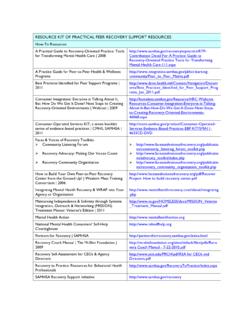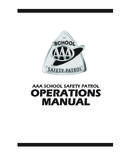Transcription of BEACON HEALTH OPTIONS SUBSTANCE USE DISORDER PEER ...
1 BEACON HEALTH . OPTIONS . SUBSTANCE USE. DISORDER . peer SPECIALIST. TRAINING. MANUAL. February, 2016. 1. TABLE OF CONTENTS. 1 INTRODUCTION. 2 UNDERSTANDING THE ROLE OF A peer RECOVERY support SPECIALIST. 3 GUIDING PRINCIPLES FOR peer support . 4 TRAUMA INFORMED support . 5 RESILIENCY, RECOVERY AND WELLNESS. 6 SUBSTANCE USE DISORDER CONDITIONS AND TREATMENTS. 7 GRIEVING AND SUBSTANCE USE DISORDERS. 8 GOAL-SETTING, PROBLEM-SOLVING, AND BUILDING RELATIONSHIPS. 9 KNOW WHEN TO REFER. 10 CLIENTS RIGHTS; CONFIDENTIALITY; ETHICS. 11 MEMBER RIGHTS AND RESPONSIBILITIES. 12 ADVOCATING FOR CLIENTS. 13 INTERPERSONAL AND COMMUNICATION SKILLS. 14 USING YOUR PERSONAL STORY TO HELP OTHERS. 15 CULTURAL COMPETENCY. 16 RESOURCES. 17 NAVIGATING THE BENEFITS SYSTEM. 18 BASIC WORK COMPETENCIES. 19 SELF-CARE. 20 SUMMARY. 2. INTRODUCTION. This manual was created to train peer specialists who are or who will be working in treatment programs with clients who are eligible for Colorado Medicaid.
2 peer -based recovery support services are an important part of the service delivery system under Colorado Medicaid. BEACON HEALTH OPTIONS , in partnership with 8 community mental HEALTH centers, formed Colorado HEALTH Partnerships (CHP). CHP has a contract with the state of Colorado to manage the behavioral HEALTH benefit for forty three (43) of Colorado's sixty-three (63) counties, so the information in this manual is written to support peer specialists working in the BEACON HEALTH OPTIONS Provider Network. It has been necessary to tightly condense complicated ideas in this manual, so the writers encourage trainees to further explore the concepts contained in the training. Special Thanks Terry Krow, the SUBSTANCE Use DISORDER Coordinator for BEACON HEALTH OPTIONS was the primary author of the manual. Peter Broderick, the BEACON HEALTH OPTIONS , Colorado, Vice President of Clinical Operations and Haline Grublak the BEACON HEALTH OPTIONS , Colorado, Vice President of Member and Family Affairs deserve special thanks for supporting the work of peer specialists .
3 They provided administrative support , technical expertise and time for meetings, consultation and editing from their demanding schedules to insure this project's success. 3. CHAPTER 2. Learning Objectives You will learn the answers to the following questions: 1. What is a peer support Specialist? 2. What kinds of work do peer support specialists do? 3. Where are peer support Services offered? UNDERSTANDING THE ROLE OF A peer RECOVERY. support SPECIALIST. What is a peer support Specialist? A peer support Specialist is a person who has progressed in their own recovery from alcohol or other drug abuse or mental DISORDER and is willing to self-identify as a peer and work to help others with chemical dependency or a mental DISORDER . Because of their life experience, such persons have expertise that professional training cannot replicate. Who Delivers peer Recovery support Services?
4 Services are delivered by people with the lived experience of recovery from addiction to alcohol and other drugs, either as a person in long-term recovery or a family member or significant other. There is a mutuality to peer recovery support , with the person giving and receiving support benefiting from the interaction. (White, 1998.) Whether paid or volunteer, there are various levels of training offered to members/peers who are providing services. Organizations that have an all-volunteer peer base have paid staff whose primary job is to train and supervise volunteer peers. In a growing number of states, certified peer addiction recovery support specialists are employees of the organization and are supervised by other paid staff in the organization. When are peer Recovery support Services offered in the Recovery Process? peer services can be helpful at any time in a person's recovery journey and there are roles for peer specialists across the full continuum of recovery, even if a person doesn't use formal treatment services.
5 They can be offered before an individual enters treatment or when they are waiting for a service opening. They can complement treatment services while a person is in a 4. program. peer services can help after a person finishes treatment, helping a person manage their own recovery while living in the community. peer specialists can connect clients with community resources to support ongoing recovery or give a person the opportunity to further enrich their recovery by volunteering in recovery support settings. For the millions of Americans who are not receiving clinical treatment, peer services provide an important community network (including or in lieu of mutual aid groups) and infrastructure for recovery initiation. peer support programs are an important way for increasing a person's self-efficacy beliefs and decision making abilities. Evidence shows that seeing persons similar to oneself successfully performing activities can increase a person's belief in his or her own ability to perform those activities successfully.
6 Where are peer Recovery support Services Delivered? Depending on where a person is in his or her recovery process, they can receive services in a variety of settings. peer recovery support services are being delivered in urban and rural communities to many different population groups defined by age (adolescents, seniors); race or ethnicity (Native American, Latino, African American); gender and sexual orientation (women's groups, groups for gay men); and/or co-existing conditions/status (incarceration, homelessness, mental illness or HIV/AIDs). Many recovery community organizations have established recovery community centers where education, advocacy, and sober social activities as well as a place for mutual-aid meetings are offered in addition to peer recovery support services. These recovery community centers are helping to bridge the gap between treatment and incarceration and long-term recovery.
7 peer recovery support services are also offered in churches and other faith-based institutions; in recovery homes or sober housing; in jails and prisons; as part of probation and parole programs;. in Drug Courts; in HEALTH care settings for people with HIV/AIDs and other HEALTH care centers;. and addiction and mental HEALTH service agencies. In Colorado, SUD services are now a covered benefit for Medicaid members. Most peer services will be delivered through a community mental HEALTH center or program that exclusively serves persons with a SUD diagnosis. Types of peer Recovery support Services peer /Recovery Coach: These are individuals who are trained to serve as a personal guide and mentor for people seeking or already in recovery, regardless of pathway to recovery. Some activities of a peer /recovery coach include: Providing emotional support 5. Helping the client set recovery goals and develop a recovery plan Assisting clients in restructuring daily activities and schedules to accommodate recovery Supporting clients while they develop new social networks Aiding clients in improving life skills and gaining access to services and resources The peer /recovery coach does not perform mutual aid service work, but can link individuals to mutual aid support .
8 (The role of peer /Recovery Coach often includes tasks of peer Resource Coordinator: see below.). peer Resource Coordinator: Connects individuals (and sometimes families) to resources in the community. These resources support recovery and include programs such as housing, employment, medical and professional services. peer specialists teach people how to navigate different systems, services, and cultures such as child welfare, criminal justice, mental HEALTH , primary HEALTH (including HIV), and dental services. support Group Facilitator: Organizes, convenes, and facilitates general and special topic recovery support groups. Groups are often ongoing, can be gender and culture-specific, and cover issues such as living with HIV and/or Hepatitis C, living without substances and criminal activity, family reunification, and developing new friendships and support circles.
9 Workshop Facilitator: Develops and gives educational workshops that distribute information, develop knowledge, and build skills to support recovery. Workshops can be single or multiple events and cover a range of topics including job-readiness skills, reentry, expunging a criminal record, nutrition, and healthy relationships. Coordinate Drug-free Activities: Provides opportunities for individuals and family members to access social inclusion, association and kinship with community, and leisure and socialization activities in SUBSTANCE -free settings. Recovery Community Centers: Provide a hub for peer recovery support services, other community supports, and public space for individuals and families to convene in an environment that supports and promotes recovery. peer Mentor: The mentor often meets with the client individually, and works with the client to set goals and identify barriers to reaching those goals.
10 Although these interactions often happen one on one, they are very different than clinical services. The peer Specialist uses his own experiences as an example or as an analogy to events in the client's life. This can create a context that is familiar to the client and helps when the client is struggling with their own choices and decisions. 6. CHAPTER 3. Learning Objectives You will learn the answers to the following questions: 1. What is a practice standard? 2. How do practice standards for peer support specialists affect their work? 3. What are three things a peer support Specialist should not do when working with others? GUIDING PRINCIPLES FOR peer support . Working Definition and Guiding Principles of Recovery SAMHSA developed a Working Definition and Guiding Principles of Recovery. These documents were put together after several years of study and talking to hundreds of consumers.






